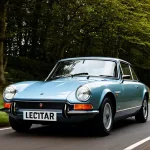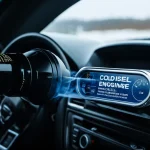Essential UK Regulations for Classic Electric Car Conversion
Understanding UK car conversion regulations is crucial when transforming a classic vehicle into an electric one. The process is governed primarily by the Driver and Vehicle Licensing Agency (DVLA), which sets specific rules under the DVLA electric conversion rules to ensure converted vehicles meet safety and environmental standards.
Key agencies involved include the DVLA, the Ministry of Transport (MOT), and vehicle standards authorities, all overseeing aspects like roadworthiness, emissions, and vehicle identity. The DVLA requires detailed applications about the conversion, including technical specifications and evidence that the vehicle complies with modern safety norms.
In the same genre : Exploring the environmental effects of hybrid vehicles in the uk: a comprehensive analysis
These measures fall under primary legislation such as the Road Vehicles (Approval) Regulations, which prescribe criteria for road use eligibility. Guidance documents from the DVLA outline necessary documentation, testing requirements, and how the conversion affects vehicle registration.
Adhering to classic car electric legal requirements is not just about compliance; it preserves the vehicle’s legitimacy and safety on public roads. Ignoring these can lead to failed MOT tests or legal issues. Owners should engage with these frameworks early to navigate the conversion smoothly and meet all regulatory demands.
Have you seen this : Revamp your classic ride: the essential uk handbook for updating safety features
Step-by-Step Process to Legal Compliance
Ensuring your electric vehicle conversion is road-legal
Starting your EV conversion process in the UK requires a thorough compliance checklist to meet DVLA standards. First, notify the DVLA about your intent to convert your vehicle to electric. This involves submitting documentation proving the vehicle’s original details and your planned modifications.
Next comes the mandatory inspections. Your converted vehicle must undergo a series of assessments including an MOT test that verifies safety and functionality post-conversion. The DVLA application guide emphasizes that passing these inspections is crucial before approval can be granted.
Finally, once approved, you must update the vehicle’s registration. This includes changes to the vehicle identification details reflecting its new electric status. Proper registration ensures your EV is legally recognized and eligible for benefits like reduced road taxes.
Following this structured EV conversion process UK framework reduces the risk of delays and non-compliance. Staying informed via the DVLA application guide and adhering strictly to the compliance checklist helps streamline your conversion journey, making EV ownership both legal and hassle-free.
Taxation and Insurance Considerations
When converting your vehicle to electric, understanding electric vehicle road tax UK rules is essential. Most fully electric vehicles benefit from exemption or reduced rates of Vehicle Excise Duty (VED), but the specifics can vary significantly for EV conversions. For example, if your vehicle was originally registered decades ago but has undergone an electric conversion, VED liability might differ from that of new electric models. It’s crucial to verify whether your EV conversion qualifies for existing exemptions or altered rates under the current scheme.
Insurance is another important factor. After an EV conversion, notifying your insurer about the modification is mandatory. Many mainstream insurers may not fully cover converted vehicles, so seeking classic car insurance EV policies or specialist EV coverage ensures appropriate protection. Specialist insurers understand the value and risks associated with electric conversions, providing tailored policies.
Historic vehicle status can be affected by the conversion, influencing both insurance costs and tax liabilities. Maintaining or losing classic status may impact eligibility for exemptions on road tax and insurance premiums. Considering these nuances in VD for EV conversions will help you navigate regulatory frameworks effectively and secure the best possible terms for your converted vehicle.
Meeting Safety and Emissions Standards
Ensuring your electrified classic car complies with UK vehicle safety regulations is crucial. Every converted electric vehicle must meet construction and safety standards similar to those applied to new vehicles. This includes adherence to regulations on lighting, braking systems, and overall vehicle integrity.
Testing is a key step. Classic cars converted into EVs typically require an Individual Vehicle Approval (IVA) test. This assessment verifies that your vehicle safely meets roadworthiness criteria post-conversion. The IVA test covers essential safety features and confirms the reliability of your EV conversion, assuring compliance with UK vehicle safety regulations.
Regarding emissions, electric conversions benefit from specific exemptions. Because they produce no tailpipe emissions, classic cars converted to electric propulsion fall outside standard emissions testing requirements. This emissions exemption means converted vehicles are often exempted from annual emissions checks, making them attractive for environmental compliance.
By focusing on these safety tests and emissions standards, classic car owners can enjoy their electrified vehicles with confidence, knowing they comply fully with UK regulations and benefit from exemptions that support cleaner driving.
Tips and Resources for a Smooth Conversion Journey
Navigating EV conversion support UK can be complex, but using the right resources streamlines the process remarkably. Start by consulting an official documentation checklist EV, which ensures all necessary paperwork is prepared for approval. This checklist typically includes detailed specifications, safety certifications, and emissions test results.
Engaging with dedicated classic car conversion advice forums and support groups is invaluable. These communities offer firsthand experience, troubleshooting tips, and up-to-date advice on avoiding common regulatory pitfalls. For example, many conversions falter due to incomplete documentation or overlooking the IVA (Individual Vehicle Approval) requirements. Peer insights can help prevent such setbacks.
A key challenge is aligning your project with UK vehicle regulations. Precise adherence to noise limits, safety standards, and environmental rules is non-negotiable. Leveraging EV conversion support UK resources and properly following a documentation checklist EV significantly reduces delays.
Practical preparation combined with expert advice from classic car conversion advice sources equips you to navigate the regulatory landscape confidently. This approach makes your electric conversion project smoother and compliant from start to finish.



